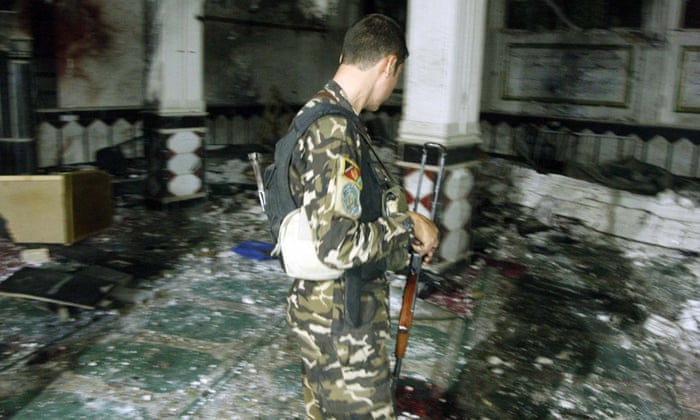A Brief Colonial History Of Ceylon(SriLanka)
Sri Lanka: One Island Two Nations
A Brief Colonial History Of Ceylon(SriLanka)
Sri Lanka: One Island Two Nations
(Full Story)
Search This Blog
Back to 500BC.
==========================
Thiranjala Weerasinghe sj.- One Island Two Nations
?????????????????????????????????????????????????Wednesday, August 2, 2017
Dozens killed in bombing of mosque in Afghan city of Herat
At
least 29 dead and more than 60 wounded in blast at Shia mosque, with at
least two attackers – including a suicide bomber – thought responsible

A soldier inspects the mosque where a blast killed dozens of Shia worshippers in Herat. Photograph: Anadolu Agency/Getty Images
Reuters in Herat-Tuesday 1 August 2017
 A suicide attack on a Shia mosque in the city of Herat in western Afghanistan has killed at least 29 people and wounded more than 64, officials have said.
A suicide attack on a Shia mosque in the city of Herat in western Afghanistan has killed at least 29 people and wounded more than 64, officials have said.
More than 1,700 civilians have been killed in attacks in Afghanistan so far this year, hitting confidence in the government of President Ashraf Ghani.
Abdulhai Walizada, a local police spokesman, said there appeared to be
more than one attacker, with witnesses describing a suicide bomber who
detonated explosives and at least one other, a gunman who threw grenades
at worshippers.
“Two attackers entered the mosque and started shooting and throwing
grenades at people,” said Mohammad Adi, a worshipper at the mosque who
was injured in the attack and taken to hospital.
Mohammad Asif Rahimi, governor of Herat, said at least 29 people were
killed and 64 wounded in the incident which came two months after an
attack on a 12th-century mosque known as the Jama Masjid in Herat, in
which seven people died.
There was no claim of responsibility. The Taliban, fighting to install
strict Islamic law and drive foreign troops out of Afghanistan, denied
any involvement.
Ghani, whose government has been under mounting pressure because of
deteriorating security across the country, condemned the bombing and
called on religious scholars to “raise their voices against the
terrorist attacks”.
Afghanistan has traditionally been relatively free of the sectarian violence common in Iraq or Syria but hardline Sunni militants from the local branch of Islamic State have repeatedly attacked the mainly Shia Hazara minority in the past year.
The latest attack comes as the Trump administration considers sending
more US troops to bolster the Nato-led coalition advising and assisting
security forces in Afghanistan.

